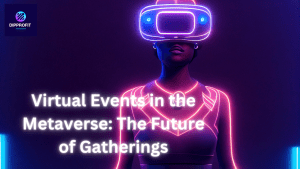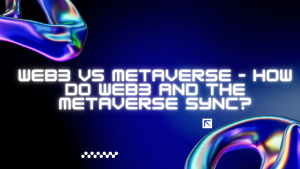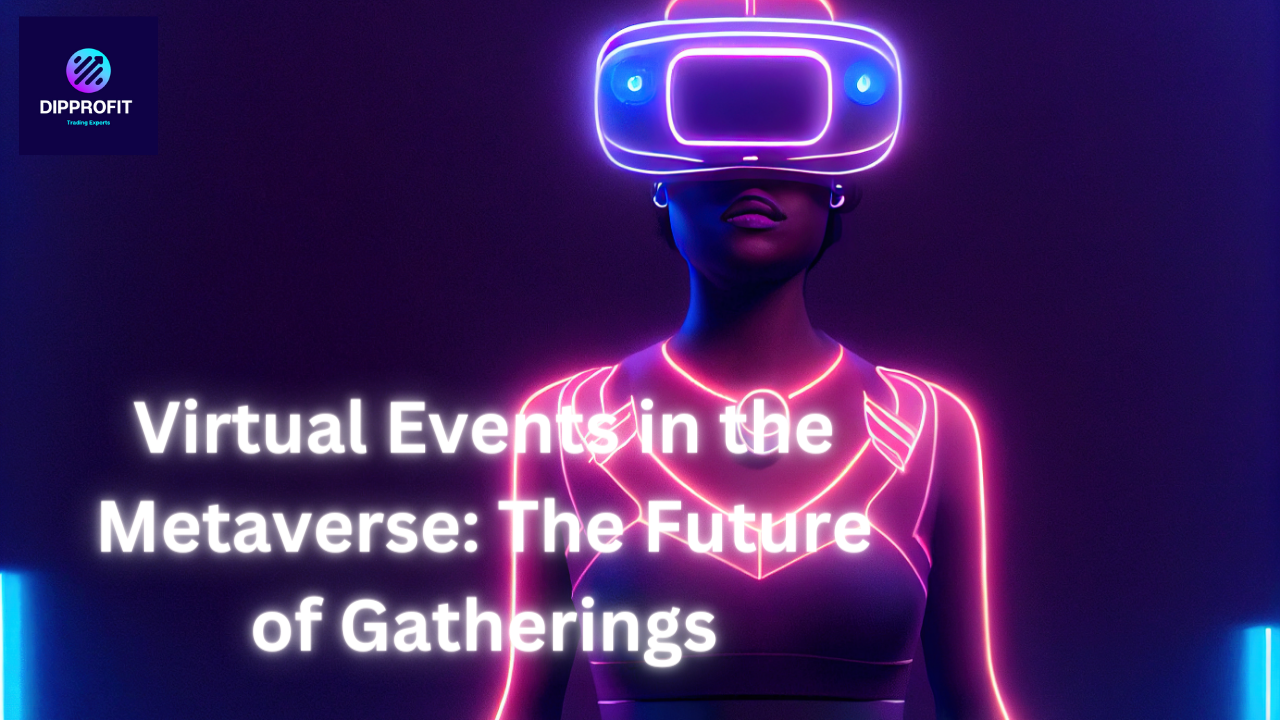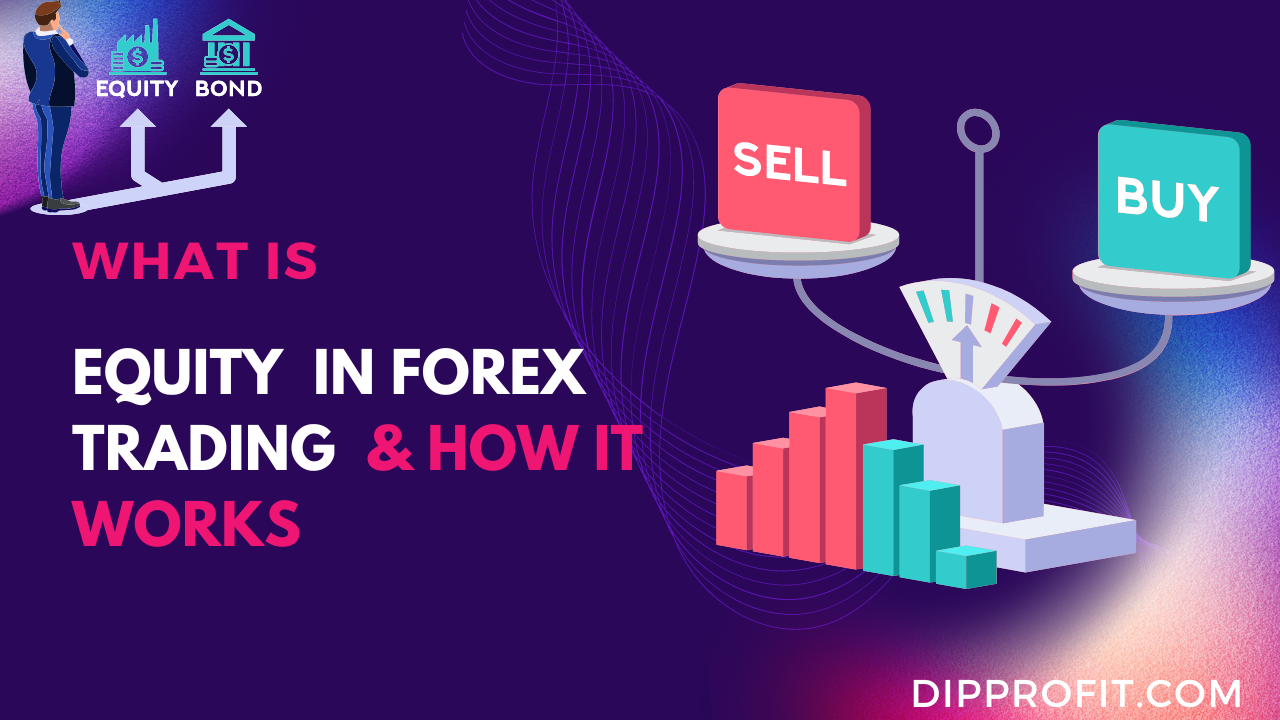
The world has changed dramatically in the past years, and virtual events have become the norm. From virtual conferences to online happy hours, it’s clear that the way we connect and gather is going to be forever changed. But what does this bring?
Enter the Metaverse, a virtual world where anything is possible.
In this blog post, I’d like us to explore what virtual events in the metaverse is all about and how they could shape the future of gatherings.

Virtual events are becoming increasingly popular for conferences, events, and even social gatherings as it makes room for a more immersive experience than traditional video conferencing.
And many people say that gatherings in the metaverse are the perfect way to connect with people around the world, eliminating the need to travel to attend events.
With the metaverse, people can experience real-time interaction and collaboration in a 3D environment, allowing them to explore and engage in conversations in a way that is not possible with video conferencing.
This type of engagement is not just limited to conferences, events, or social gatherings but can also be used for gaming and entertainment.
Some users say that the new internet is the best thing that has evolved after cell phones, while other critics say it’s just for a short period of time and will crash if unstable.
While some other users say they don’t know how the metaverse operates and what it holds for the near future but they feel it’s the next big thing in line. So what’s this metaverse you’re all talking about?
Introduction
The term “metaverse” refers to a joint virtual space created by the unification of physical and virtual reality.
See also: Web3 Vs Metaverse – How Do Web3 And Metaverse Sync?
Must-Have Metaverse Devices/Gears To Enter The Metaverse

Let me give you a quick story about the metaverse…
Once upon a time, in the Metaverse, virtual events became the norm. With the ability to bring people together from all over the world, in a safe and immersive environment, virtual events became a popular way for people to connect and have fun.
One day, a group of friends who were musicians decided to host their virtual music festival in the Metaverse.
They wanted to bring people together to enjoy music, dance, and each other’s company. They worked tirelessly to create a stunning virtual environment, complete with a stage for the performers, food vendors, and even games and activities.
As the festival day approached, people from around the world logged into the Metaverse to attend. They were amazed at what they saw. The virtual environment was breathtaking, with incredible visuals and sound. It was like they were transported to another world.
As the festival got underway, the crowd was in for a treat. Performers from all over the world took to the stage, delivering an unforgettable experience for those in attendance. People danced, sang, and laughed together, feeling like they were truly part of something special.
For many attendees, the virtual music festival was a chance to connect with others in a way they never thought possible. They made new friends, shared experiences, and left feeling uplifted and inspired.
In the aftermath of the festival, the friends who organized it were hailed as pioneers of virtual events.
People all over the world were eager to experience more of what the Metaverse had to offer, and virtual events became a staple of life in this virtual world.
And so, the virtual music festival became a shining example of what was possible in the Metaverse, and a testament to the power of technology to bring people together from all over the world, to share experiences and create memories that would last a lifetime.
This is what virtual events in the metaverse are all about.
Virtual experience in the metaverse simply refers to the use of virtual reality (VR) technology to create immersive, interactive experiences in a simulated environment.
In the metaverse, users enter a virtual world through the use of VR headsets or other devices and are able to interact with the environment and other users as if they were in a real-world setting.
Some virtual events that have been hosted in the metaverse include the fashion week held in Decentraland in April 2022.
#MVFW which is the first digital fashion week to be hosted online with VR was hosted on March 24-27, 2022. A second edition of the conference is set to be hosted this year but a date hasn’t been released yet.
The event involved brands like Dolce & Gabbana, Phillip Plein, Hermes Birkin, and Jacob & Co. watches, etc. There were also catwalks to showcase new in-game wearables, panels, art exhibitions, and other activities by different brands and designers last spring in the Metaverse fashion week.
The following are some major virtual events that have taken place in the metaverse:
- Metaverse XR Festival: The first Metaverse XR Festival was held in November 2020 and brought together artists, musicians, and innovators worldwide to showcase the future of immersive experiences.
- Alphalake AI: Alphalake AI is an annual conference that focuses on artificial intelligence and machine learning. In 2020, it was held in the metaverse for the first time, attracting over 10,000 attendees.
- Music festivals: Many music festivals, including Coachella, were moved to the metaverse during the COVID-19 pandemic. Despite being a virtual experience, these events still allowed music fans to experience performances by their favorite artists in a virtual environment.
- Virtual conferences: A number of virtual conferences, including the annual Consumer Electronics Show (CES), have been hosted in the metaverse. These events have provided a platform for thought leaders and experts to share their insights and connect with attendees worldwide.
The advancement of VR technology and the COVID-19 pandemic was also one of the reasons for the increase in the number of virtual events hosted in the metaverse from 2020 to 2022.
Hosting virtual events in the metaverse requires a lot of adequate preparation and concise application, but are there any benefits of virtual events in the metaverse
The Benefits of Virtual Events in the Metaverse
Some critics might say accessing virtual events in the metaverse requires high-speed internet which makes them a one-sided affair and not too sought after by those who lack access to such technology.
But one thing about virtual events in the metaverse is that they offer a unique and immersive experience that cannot be replicated in the real world. People can interact with each other in an environment that allows them to express themselves without the limits of physical space or time.
They also have the potential to reach a larger audience due to their global reach and the low costs associated with hosting them.
In summary, virtual events in the metaverse offer several benefits over traditional in-person events, including:
- Accessibility: Virtual events allow people from all over the world to participate, regardless of their physical location. This makes it easier for attendees to participate, and for event organizers to reach a wider audience.
- Safety: With virtual events, there is no need for attendees to travel physically, reducing the risk of exposure to illness or other health risks.
- Cost-effectiveness: Virtual events often have lower overhead costs, making them more affordable and accessible to a wider range of attendees.
- Immersive experiences: Virtual events in the metaverse offer highly immersive, interactive experiences that can be customized to the individual. This allows attendees to have a more personal and memorable experience.
- Environmentally friendly: Virtual events have a much lower carbon footprint than traditional in-person events, making them a more environmentally-friendly option.
- Data and insights: Virtual events can provide organizers with valuable data and insights about their attendees, helping them to make informed decisions and improve future events.
- Scalability: Virtual events have the potential to reach a larger audience than traditional in-person events, as there are no limitations on the number of attendees.
Virtual events that use augmented reality (AR) technology, are gaining in popularity as an alternative to in-person conferences and other social events. One instance of a major gathering that was hosted virtually is the 2020 Democratic National Convention in the United States of America.
Due to the pandemic, Democrats decided to forgo a large in-person convention for a virtual summit where delegates could participate virtually through Zoom and watch speeches from their computers or phones.
This event showed that even in the face of debilitating health and safety restrictions, political parties can still hold large conventions and gather their base in meaningful ways with the help of technology.
Despite all these benefits, there are still some challenges that we have to overcome to successfully host virtual events in the metaverse. Some of them are listed in the next section of this post.
Challenges of Hosting Gatherings in the Metaverse
Hosting a gathering in the metaverse requires new strategies and technologies to create a virtual space that feels as immersive as possible. Platforms like Zoom, Google Hangouts, and Decentraland are being used to create virtual events that provide a sense of connection and community.
Attendees can be invited to join these virtual events through a variety of methods, such as clicking a link, downloading an app, or even entering a virtual world. They are often enhanced with interactive features such as live chat, polls, and virtual stages.
Furthermore, hosting an event in the metaverse can be quite costly due to the investment necessary for providing users with a truly immersive experience.
This is especially true if you intend to host multiple events as the cost of hardware and software can quickly add up. However, through a well-organized plan and precise budgeting, those looking to hold events in the metaverse can do so while still keeping their costs low.
Tools and Platforms for hosting Virtual Events in the Metaverse
At this point, you can recall that we’ve talked about examples of virtual events, their benefits, and even some challenges that are encountered in hosting online events.
The next section of this article now talks about some tools and platforms which are usually used in hosting virtual events in the metaverse.
There are various tools and platforms designed specifically for hosting events in the metaverse, such as Mozilla Hubs, VRChat, and Rec Room.
In the metaverse, there are numerous platforms and tools for hosting virtual events. Some of the most well-known are:
Roblox: is an online gaming platform that allows users to build and share their own virtual worlds and experiences.

Decentraland: is a blockchain-based decentralized virtual world in which users can buy, sell, and create their own digital assets and experiences.

AltspaceVR: This is a real-time virtual reality platform that allows users to connect, attend events, and participate in immersive experiences with other users.
VRChat: is a social virtual reality platform that allows users to create, share, and participate in interactive experiences and events with other users.
Somnium Space: is a decentralized, open-source virtual world where users can buy, sell, and create their own virtual reality experiences.
These tools allow users to create immersive experiences to gather virtually, using 3D models and avatars to interact in virtual worlds. From virtual conferences and conventions to intimate meet-ups and dance parties, metaverse gatherings are becoming increasingly popular.
Wrapping up
In conclusion, the future belongs to VR technology because it will allow people to simulate real-world experiences within the Metaverse, such as attending concerts, conferences, and more.
It is a great opportunity for people to connect with others, regardless of their physical location, gender, date, or race to gather and experience events that are usually impossible.
So explore the world of virtual events in the Metaverse and learn how they are changing the way we gather and connect. Get ready for the future of events today.


